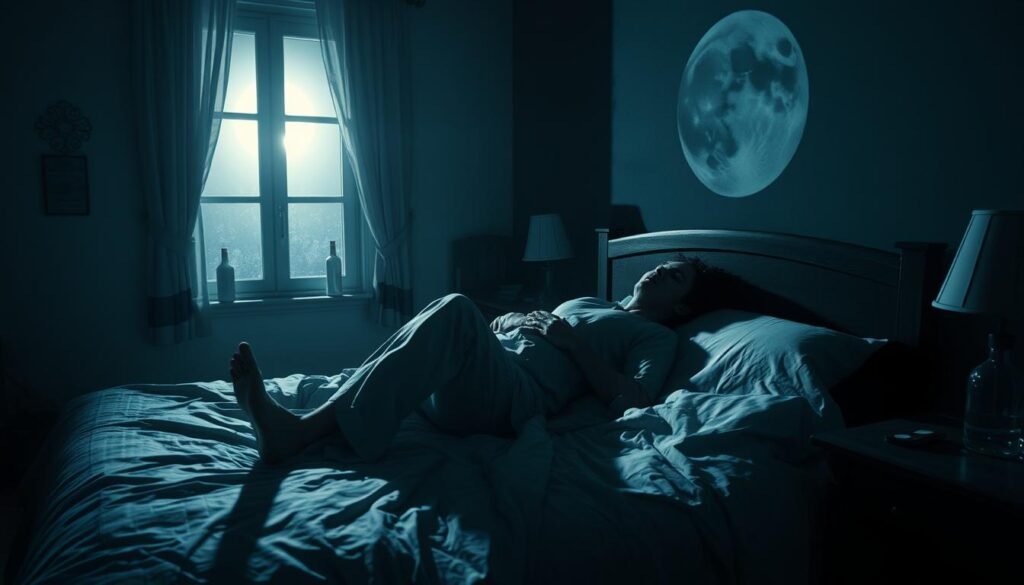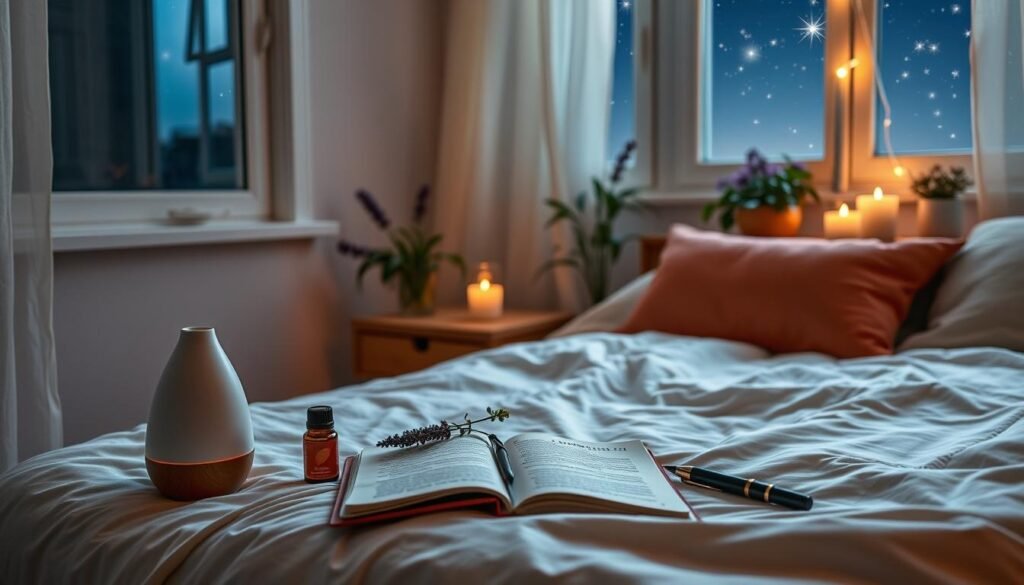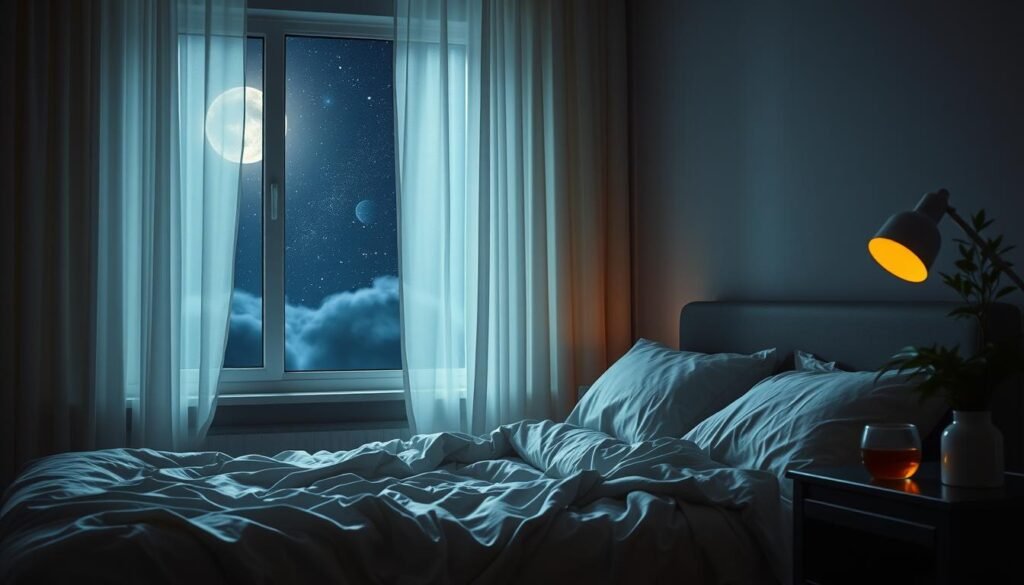Did you know that 58% of alcoholic men have trouble sleeping in their first six days without alcohol? This fact reveals a strong tie between alcohol abuse and sleep problems. For those working on staying sober, dealing with sleeplessness is a big challenge. It greatly affects their recovery journey. Managing sleep problems is key to avoid going back to drinking and to improve health.
Sleep issues can start quickly, usually within eight hours of the last drink. They get worse a few days later. Everyone experiences this differently. Heavy drinking leads to a strong need for alcohol that remains even after stopping. But, with the right tips and strategies, it’s possible to beat insomnia.
Next, we’ll look into why insomnia is common after stopping alcohol. We’ll also share tips to help improve sleep during recovery.
Key Takeaways
- 58% of alcoholic men experience insomnia early in withdrawal.
- Sleep disturbances often occur within hours of ceasing alcohol intake.
- Addressing insomnia is crucial to reduce relapse risk in recovery.
- Chronic sleep issues can impact overall functioning and health.
- Effective coping strategies can aid in overcoming sleeplessness.
The Connection Between Alcohol and Insomnia
The link between drinking alcohol and not being able to sleep well is deep. People getting help for drinking problems often find it hard to sleep. Between 25% and 72% of them say they can’t sleep well, which shows how common it is.
Understanding Sleep Disturbances in Recovery
Sleep problems after stopping alcohol can last a long time. It might take months or years to sleep well again. People find it hard to fall asleep and stay asleep.
Bad sleep makes stress worse and can harm your health. It can make people feel cranky, anxious, and might even lead to drinking again. Finding ways to sleep better is crucial.
Statistics on Insomnia During Alcohol Detox
A lot of people quitting alcohol have insomnia. Research shows 36% to 91% of them struggle to sleep. Also, about 10% of Americans have short-term insomnia, and 20% get chronic insomnia.
Many use alcohol to try to sleep, which makes things worse. This shows how important it is to find better ways to improve sleep during detox.
Why Does Alcohol Withdrawal Cause Insomnia?
When you stop drinking, insomnia can kick in. This is because your brain goes through big changes. It has to do with brain chemicals and how sensitive your nervous system is.
Neurochemical Imbalance
Drinking a lot messes up the brain’s chemical balance. Neurochemical imbalance happens. GABA, a neurotransmitter that helps you relax and sleep, gets thrown off. Once you stop drinking, less GABA means more brain activity. You end up feeling anxious and can’t sleep well.
Hypersensitivity of the Central Nervous System
The central nervous system gets super sensitive during withdrawal. It causes you to feel restless and have too many thoughts. It’s hard to chill out. Sadly, more than half of the people kicking alcohol face these sleep issues.
Disruption of Circadian Rhythms
Drinking screws up your circadian rhythms, or natural sleep cycle. Alcohol messes with the body’s clock. It misaligns it. This makes sleeping well really tough when you quit alcohol. Sleep problems can drag on for a long time unless they’re handled.
To deal with sleep issues from quitting alcohol, you need to understand what’s happening. Getting help is key. Places like BrightView offer support. They use meds and therapy to get your sleep back on track. Check out this resource for more info on fixing sleep problems caused by quitting alcohol.

Coping Strategies for Insomnia in Sobriety
Dealing with insomnia after quitting alcohol needs careful steps. A supportive environment and healthy daily habits improve sleep. Consider these proven approaches.
Commit to a Regular Sleep Schedule
Keeping a steady sleep schedule is key. Sleeping and waking up at the same time regulates your internal clock. This can ease insomnia symptoms and improve sleep.
Aim for a routine that cues your body for sleep at certain times. This enhances sleep quality.
Creating a Relaxing Bedtime Routine
A relaxing nighttime routine tells your body it’s time to slow down. Before bed, try reading, taking a warm bath, or gentle stretching. These activities create a calm mood.
Avoid bright screens and lights before bedtime. They can disrupt melatonin, which helps you sleep.
Mindfulness and Stress Reduction Techniques
Mindfulness, like meditation and deep breathing, helps lower anxiety and stress. Center your thoughts to slow a racing mind. These practices calm the mind and improve emotional health in sobriety.

How to Deal with Insomnia After Quitting Alcohol
Beating insomnia is tough after you stop drinking alcohol. Some strategies can help you sleep better and aid in your recovery. These include cutting down on stimulants and making exercise a part of your life.
Limiting Stimulants Before Bed
Cutting back on stimulants such as caffeine and nicotine before bed is a good step. These can make it tough to sleep well. Try not to have these stimulants in the evening to help your body get ready for sleep.
The Importance of Physical Activity
Being active is key in fighting post-alcohol insomnia. Exercise helps regulate your sleep. Doing moderate exercise for 30 minutes a few times a week can enhance sleep quality.
Finding the best time to work out is important, as it varies from person to person. Staying active can really improve your sleep and aid in recovery. For tips on getting better sleep, click here.

| Strategy | Description | Result |
|---|---|---|
| Limit Stimulants | Avoid caffeine and nicotine especially in the evening. | Potentially better sleep quality. |
| Regular Exercise | Engage in 30 minutes of moderate activity regularly. | Improved sleep patterns and overall recovery. |
| Establish Sleep Schedule | Go to bed and wake up at the same time every day. | Enhanced ability to fall asleep predictably. |
Natural Remedies for Insomnia After Alcohol Withdrawal
Combating insomnia following alcohol withdrawal is crucial for recovery. Natural remedies are safer and can enhance sleep. They include herbal supplements and mindfulness, which help relax and improve sleep quality.
Herbal Supplements and Sleep Aids
For those battling sleep issues after quitting alcohol, herbal sleep aids are helpful. Key options include:
- Valerian Root: It calms and traditionally helps with insomnia. Studies show it might improve sleep quality.
- Chamomile: This herb is often taken as tea. It’s known for relaxation and anxiety reduction, ideal before sleep.
- L-theanine: Found in green tea, this amino acid can shorten the time it takes to fall asleep and improve NREM sleep.
Adding these herbal sleep aids to your nightly routine can help fight insomnia holistically.
Mindfulness Meditation and Breathing Exercises
Mindfulness meditation is another way to tackle insomnia. It promotes calmness and helps manage stress. Here are some useful techniques:
- Guided Meditation: A guided session can ease relaxation and prepare you for sleep.
- Breathing Exercises: Deep breathing or the 4-7-8 technique can reduce heart rate and ready the body for sleep.
Daily mindfulness can improve sleep and help with recovery from substance withdrawal. By using these natural methods, recovery becomes more manageable.
Sleep Hygiene for Recovering Alcoholics
For those recovering from alcohol dependency, good sleep hygiene is key. A good environment improves sleep and recovery. Making your bedroom a sanctuary for sleep and healthy habits are important for restorative rest.
Making Your Bedroom a Sleep Sanctuary
A calm, distraction-free bedroom is crucial for better sleep hygiene for recovering alcoholics. Here are some tips to create a serene space:
- Limit Noise: Think about getting white noise machines or earplugs to block out loud sounds.
- Adjust Lighting: Blackout curtains help keep your room dark, perfect for sleeping.
- Invest in Comfortable Bedding: A good mattress and soft pillows are key.
- Keep the Room Cool: A temperature between 60 to 67 degrees is best for sleeping.
- Remove Distractions: Don’t let phones or laptops in your bedroom. Screens make it harder to fall asleep.
Establishing Healthy Sleep Habits
Creating a sleep sanctuary is just the first step. Adopting healthy sleep habits is also critical. These routines promote better rest and strengthen the association between bed and sleep:
- Keep a regular sleep schedule. Go to bed and wake up at the same times daily.
- Use your bed only for sleep. Avoid watching TV or eating in bed.
- Stay away from big meals and caffeine before bedtime. They can upset your stomach.
- Try calming pre-sleep routines like reading or warm baths.
- Practice relaxation techniques such as mindfulness meditation to ease anxiety and promote calmness at bedtime.
Embracing these steps can aid recovering individuals in developing healthy sleep habits. This contributes to their recovery journey.
Managing Alcohol Withdrawal Symptoms: Insomnia
It’s key to spot insomnia early during recovery from alcohol. Persistent insomnia can worsen mental health, leading to anxiety, fatigue, and more irritability. Recognizing these symptoms early helps in your healing journey and encourages seeking help if needed.
Recognizing and Acknowledging Symptoms
Knowing the signs of insomnia is crucial for those quitting alcohol. Research says detoxing can increase insomnia risk by five times compared to others. This can make recovery harder and symptoms might last even after withdrawal is over. You might feel:
- Tiredness
- Poor concentration
- Low enthusiasm
- Irritability
Insomnia for over a month can really affect your day and mood. Surprisingly, about one third of adults face this, showing symptoms like those in depression. It’s important to watch your sleep habits and get help if trouble persists post-detox.
Seeking Professional Help When Necessary
Getting professional help is crucial for ongoing withdrawal issues. If insomnia sticks around, talking to a doctor for specific treatments is a good move. Your options might include:
- Cognitive Behavioral Therapy for Insomnia (CBT-I)
- Support groups focused on recovery
- Consultations with sleep specialists
Studies show that sticking with treatment can really help sleep quality, aiding in long-term insomnia recovery. Asking for help not only deals with insomnia but also helps your overall recovery path.
| Insomnia Symptoms | Impact on Recovery | Need for Professional Help |
|---|---|---|
| Tiredness | Increased irritability and fatigue | Consultation for tailored treatment plans |
| Poor concentration | Reduced ability to follow recovery programs | Cognitive Behavioral Therapy recommended |
| Low enthusiasm | Lower engagement in recovery activities | Support groups and therapy considered |
| Irritability | Strain on personal relationships | Guidance from mental health professionals needed |
Overcoming Sleeplessness After Quitting Drinking
Quitting alcohol may lead to sleeplessness. To overcome this, adopt effective long-term recovery strategies. These include healthy sleep routines and overall wellness practices. It’s key to be consistent to help set your body’s clock right.
Good sleep hygiene is important. It helps create a restful sleeping environment.
Long-Term Strategies for Sustained Recovery
A routine helps fight sleeplessness. Do these things:
- Go to bed and wake up at the same time every day
- Exercise for at least 30 minutes daily
- Try mindfulness or relaxation techniques before bed
These habits can improve your sleep. Also, try melatonin to fall asleep faster. Natural methods like meditation or stretching calm the mind and body. It’s crucial to focus on these strategies for lasting recovery and wellness.
Building a Support Network for Recovery
Having a strong support network is key for recovery. It helps with overcoming sleep problems. Connecting with others who’ve faced similar struggles offers emotional and practical support.
Joining support groups or sober events brings a sense of community. It makes dealing with sleep issues easier. Sharing your journey can help keep you focused on sobriety.
If sleep troubles arise, there are resources and professional help available. This guidance helps navigate withdrawal symptoms. It also aligns sleep practices with recovery goals. A strong support base is vital for overcoming challenges and staying on track towards sobriety.
Conclusion
Overcoming insomnia after quitting alcohol is a big step in recovery. Studies show that up to 72 percent of people getting treatment for alcoholism deal with insomnia. This shows the strong link between stopping alcohol and sleep problems. This information tells us that if you’re struggling to sleep, you’re not alone. Many others are working to get their sleep patterns back on track.
There are several strategies to deal with insomnia, as we’ve seen in this article. Setting a regular sleep schedule helps. So does having a relaxing routine before bed. And sometimes, you might need to get help from a professional. Addressing sleep issues means recognizing they can be overcome. With dedication and the right methods, these barriers can be managed.
Recovery touches on many areas of life, and good sleep is key for lasting success. Using these tips and caring for yourself can help you beat insomnia after quitting alcohol. This leads to better sleep quality and overall health. By taking these steps, you’re moving toward a healthier future.